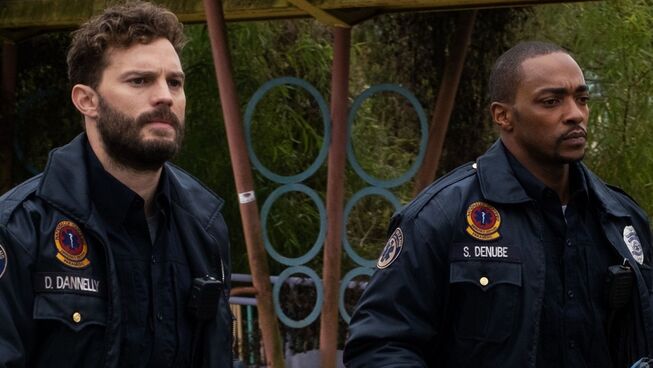
2.5 out of 5 stars
Designer drugs are not only a niche market within the narcotics world, but they have provided screenwriters a wealth of plot twists over the years. From the Milk Plus of A Clockwork Orange to NZT-48 of Limitless to the recent introduction of Power in Jamie Foxx’s Power Project, they have been part of filmmaking. Audiences have seen these synthetic drugs provide people with unlimited power, prolonged life and emotional peace, usually with a cost. It is the detrimental side-effects of these drugs that sets the stage for directors Justin Benson and Aaron Moorhead in their latest science fiction horror, Synchronic.
Paramedics in New Orleans, Dennis (Jamie Dornan) and Steve (Anthony Mackie) can say that they have seen almost everything in their partnership over the years. Until recently, when they begin to see the effects of the latest street drug, Synchronic. When they start to treat this pill's victims, it looks like any other overdose. Until they realise the survivors seem to remain in a stupor that involves an artefact from the distant past. Steve’s suspicions are eventually supported by a chance encounter with the chemist who created the drug, explaining how ingesting it will cause the person to travel back in time.
As the paramedic begins to investigate the drug, two significant events occur that bring his plans to an abrupt stop. The first being his diagnosis with an inoperable brain tumour that causes him a considerable amount of pain. Then when Dennis’ 18-year-old daughter disappears, it seems like there is no point in finding more information about the designer drug. Until he begins to link Synchronic usage to the vanishing of Brianna (Ally Ioannides). All of this begins to come together in his study of the product. Especially as his tumour begins to give him a unique ability to manipulate the effects of the drug. Which leads him on a journey through time as he attempts to find his friend’s daughter and discover what he is meant to do with the final minutes of his life.
This concept has so much potential and comes out of the gate strong. Then it loses its way as the story unfolds. The directorial team spun a fascinating web of visual cues and narrative gymnastics that set the stage for a unique twist on a familiar troupe. Like a scratch on an LP record, their story inexplicably jumps around. What seems to be artistic storytelling turns into a series of disjointed plot points. Even though they use the grey tones and foggy lighting of New Orleans to their advantage, they seem to forget where they are in the world. The Big Easy has a distinct accent and interestingly, not one character has an Orleans vocal cadence. An element that would have added cultural flavour to this tale, but an unfortunate oversight.
The friendship between Dornan and Mackie is convincing. Still, even that chemistry begins to fade as things move into the final act. It goes from being a film based on male camaraderie to being Mackie’s personal investigative project. When things move from being a team-building exercise to being solely driven by one character, it loses its richness and relational tension. Also, it inexplicably turns from a sci-fi horror film to a time-traveling investigation. This genre shift and the focus on the central characters cause the whole movie to lose its direction, diminishing the entire theatrical experience.
Synchronic had so much potential and seems to lean into a Hitchcockian-type narrative, yet something went wrong along the way. It is difficult to put the finger on the exact problem. Yet, it does open the door to a multitude of future considerations for the directorial team. It might be best to leave this project in the past and move forward, just stay away from designer drugs in the process.
REEL DIALOGUE: What does the Bible say about illegal drugs?
We understand that designer drugs are not technically illegal, but it does open the door to this conversation. Some could argue that the Bible does not say anything about illicit drug usage, which is true. Cocaine, heroin, marijuana, cannabis, or any other illegal drugs are not mentioned throughout the canon of scripture. To be clear, their exclusion does not mean that God does not have something to say about them or that it gives license to use them.
Beyond drugs being bad for your health and inciting unacceptable behaviour in our society, one thing that Christians are called to in the Bible is to respect and obey the laws of the land. Passages in the old and new testaments like Ecclesiastes 8:2-5; Matthew 22:21; 23:2-3; and Romans 13:1-7 support the argument against the use of illegal drugs. Even with all of the arguments for legalising drugs, merely disagreeing with a law does not justify breaking that law.
This is merely scratching the surface in this discussion. Hopefully, it can be part of stopping this behaviour that is destroying societies around the world.






